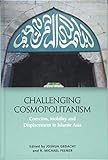Challenging Cosmopolitanism : Coercion, Mobility and Displacement in Islamic Asia / Joshua Gedacht, R. Michael Feener.
Material type: TextPublisher: Edinburgh : Edinburgh University Press, [2022]Copyright date: ©2018Description: 1 online resource (272 p.) : 4 B/W illustrationsContent type:
TextPublisher: Edinburgh : Edinburgh University Press, [2022]Copyright date: ©2018Description: 1 online resource (272 p.) : 4 B/W illustrationsContent type: - 9781474435093
- 9781474435116
- 297.095
- BP63.A1 C43 2018
- online - DeGruyter
| Item type | Current library | Call number | URL | Status | Notes | Barcode | |
|---|---|---|---|---|---|---|---|
 eBook
eBook
|
Biblioteca "Angelicum" Pont. Univ. S.Tommaso d'Aquino Nuvola online | online - DeGruyter (Browse shelf(Opens below)) | Online access | Not for loan (Accesso limitato) | Accesso per gli utenti autorizzati / Access for authorized users | (dgr)9781474435116 |
Frontmatter -- Contents -- Preface -- 1 Hijra, Ḥajj and Muslim Mobilities: Considering Coercion and Asymmetrical Power Dynamics in Histories of Islamic Cosmopolitanism -- 2 Islamicate Cosmopolitanism from North Africa to Southeast Asia -- 3 Sufi Cosmopolitanism in the Seventeenth-century Indian Ocean: Sharīʿa, Lineage and Royal Power in Southeast Asia and the Maldives -- 4 The White Heron Called by the Muezzin: Shrines, Sufis and Warlords in Early Modern Java -- 5 Variations of ‘Islamic Military Cosmopolitanism’: The Survival Strategies of Hui Muslims during the Modern Period -- 6 Writing Cosmopolitan History in Nineteenth-century China: Li Huanyi’s Words and Deeds of Islamic Exemplars -- 7 The ‘Shaykh al-Islām of the Philippines’ and Coercive Cosmopolitanism in an Age of Global Empire -- 8 Bordering Malaya’s ‘Benighted Lands’: Frontiers of Race and Colonialism on the Malay Peninsula, 1887–1902 -- 9 Afghanistan’s Cosmopolitan Trading Networks: A View from Yiwu, China -- Notes on the Contributors -- Index
restricted access online access with authorization star
http://purl.org/coar/access_right/c_16ec
Contextualizes the refugee crisis through a historical study of Muslim mobility and violenceCosmopolitanism has emerged as a key category in Islamic Studies, defining models of Muslim mobility, pluralism and tolerance that challenge popular perceptions of religious extremism. Such celebrations and valorisations of mobility and trans-regional consciousness, however, tend to conflate border-crossing with opportunity and social diversity with ethical progress. At the same time, they generally disregard the ways in which such forms of cosmopolitanism have been entwined with structures of domination, economic control and violence. This volume addresses these issues in ways that help to contextualize contemporary issues such as the global refugee crisis in relation to longer histories of Muslim mobility and coercion.Featuring new historical and ethnographic research on China and Southeast Asia, this book explores how power and violence have shaped the experiences of Sufis and state-builders, as well as refugees and rebels, contributing to a more nuanced understanding of Islamic cosmopolitanism.Open access chapters:Chapter 3 – 'Sufi Cosmopolitanism in the Seventeenth-century Indian Ocean: Sharıʿa, Lineage and Royal Power in Southeast Asia and the Maldives' by A. C. S. PeacockChapter 9 – 'Afghanistan’s Cosmopolitan Trading Networks: A View from Yiwu, China' by Magnus Marsden and Diana Ibañez-TiradoKey FeaturesProvides historical context for understanding contemporary issues of religious identity, displacement, violence and national belonging2 synoptic essays and 7 historical case studies explain the role of coercion in shaping the worlds of mobile and cosmopolitan MuslimsCase studies include Andalusian Spain and contested visions of Islamic cosmopolitanism; Hui Muslims in Qing Dynasty and Republican China; Sufis in the early modern Indian Ocean World; Muslim Rebels and Rulers in colonial-era Southeast Asia; Afghan Traders in contemporary ChinaContributorsR. Michael Feener, University of OxfordJoshua Gedacht, Rowan UniversityBruce Lawrence, Alliance of Civilizations Institute, IstanbulAndrew Peacock, University of St AndrewsSimon C. Kemper, Leiden UniversityTatsuya Nakanishi, Kyoto UniversityJessica Chen, Graduate Theological Union, Center for Islamic StudiesAmrita Malhi, The Australian National UniversityMagnus Marsden, University of SussexDiana Ibañez-Tirado, University of Sussex"
Mode of access: Internet via World Wide Web.
In English.
Description based on online resource; title from PDF title page (publisher's Web site, viewed 29. Jun 2022)


